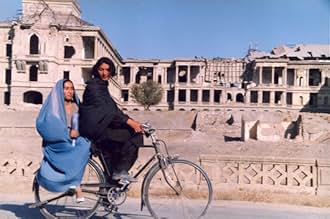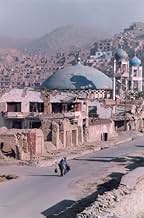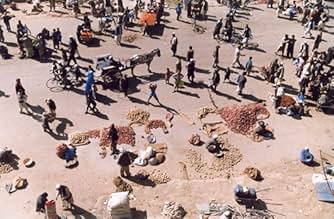Panj é asr
- 2003
- 1h 45min
CALIFICACIÓN DE IMDb
6.8/10
1.6 k
TU CALIFICACIÓN
Agrega una trama en tu idiomaIn a post-Taliban Afghanistan a young woman (Agheleh Rezaie) attends school against her conservative father's will, hoping to learn more about democracy to fulfill her dream of being the cou... Leer todoIn a post-Taliban Afghanistan a young woman (Agheleh Rezaie) attends school against her conservative father's will, hoping to learn more about democracy to fulfill her dream of being the country's next president.In a post-Taliban Afghanistan a young woman (Agheleh Rezaie) attends school against her conservative father's will, hoping to learn more about democracy to fulfill her dream of being the country's next president.
- Dirección
- Guionistas
- Elenco
- Premios
- 4 premios ganados y 2 nominaciones en total
- Dirección
- Guionistas
- Todo el elenco y el equipo
- Producción, taquilla y más en IMDbPro
Opiniones destacadas
Was not the sanction against Taliban led by the US to bring dawn into Afghanistan? Noqreh goes back and forth between her father, who believes neither education nor jobs are necessary for women, and the school, where teachers encourage female students to have any job, even the president.
Her family generously offers the place they live to the refugees coming back from Pakistan. Soon they have to go out from there, and without food, the dream of becoming the president fades out. Her white shoes become useless.
It seems the whole of the movie is a poem. That a high school girl dreams to become the president is a poem too. Maybe it is the best way to describe the world Noqreh lives in, which is at five in the afternoon, not in the morning.
How can the country, where just seeing the face of woman is sin, be open to the world? The country which was destroyed and lagged a long way behind the world by men, who are taught as superior creatures than women. Only the belief that God never dies supports them. Tough I have my belief as a Christian, I never want to shut myself away into the world of illusion.
Her family generously offers the place they live to the refugees coming back from Pakistan. Soon they have to go out from there, and without food, the dream of becoming the president fades out. Her white shoes become useless.
It seems the whole of the movie is a poem. That a high school girl dreams to become the president is a poem too. Maybe it is the best way to describe the world Noqreh lives in, which is at five in the afternoon, not in the morning.
How can the country, where just seeing the face of woman is sin, be open to the world? The country which was destroyed and lagged a long way behind the world by men, who are taught as superior creatures than women. Only the belief that God never dies supports them. Tough I have my belief as a Christian, I never want to shut myself away into the world of illusion.
What made me write the comment about this film was the post signed by "ingemli". It is easy bullshitting arrogantly about this film while sitting in the air-conditioned cinema, eating pop corns and feeling sleepy. Samira Makhmalbaf went to Afganistan after the Taliban regime was toppled, and decided not to stay a silent observer of a hard life she faced with. Together with her famous father (Mohsen Makmalbaf wrote over 30 scenarios and directed about 20 films) she developed the script and was determined to film it in Afghanistan. It was difficult to find the actors, especially a native woman who would interpret the main character who shows her face, as the country lacks professional actors. Keeping all this in mind, it all ended pretty well with non-professionals. I am not telling that this film is a masterpiece, but it has its value and deserves respect. This is a tale of a young woman who, despite his father's religious fanaticism and prohibition that she goes to school, insists to get educated to become "the president of the republic". She goes to school without her father's knowledge, putting on the white high heels and uncovering her face. The shoes, actually pretty ugly and unsuitable for walking through the ruins, have strong symbolic meaning of her rebelled femininity. Ms. Makhmalbaf follows her heroine and hers family through the hard times of loosing illusions about the possibility not only for social advancement but simple survival. I knew this strange country only by bad news on TV. This film served as a window on its other, hidden side the ordinary people's life struggle and that's its most admiring part.
The movie title, and one of its main axis, comes after a fragment of a poem written by Spanish poet Federico Garcia Lorca, called 'Llanto por la muerte de Ignacio Sánchez Mejías', dedicated to the death in 1934 of a Spanish Torero.
This poem is often seen as a premonition of Garcia Lorca's own dead, near Fuente Grande, and of the Civil War that was soon to desolate Spain.
Samira Makhmalbaf comes again with an anguishing tale of a woman that wants to believe in the role of women in a modern society while her own family is disintegrating around her.
This poem is often seen as a premonition of Garcia Lorca's own dead, near Fuente Grande, and of the Civil War that was soon to desolate Spain.
Samira Makhmalbaf comes again with an anguishing tale of a woman that wants to believe in the role of women in a modern society while her own family is disintegrating around her.
I loved the characters of the movie - the people were really *there* you could see them. Even though I did not understand the language and the subtitles were in French (which, since I am not very proficient in French, I had trouble reading sufficiently fast), I did appreciate the emotions conveyed by the protagonists. This movie might be a bit slow for some people - however I found the timing just right. A minor gripe is the sound - the recording is not particularly good and a lot of scenes are completely silent, apart from the audible tape hiss. The result is a a minor loss in atmosphere (The crackling of the fire, the sputtering of the lamp, the shifting under the blanket, the shallow sleeping breath, all could have added a lot to the silent scenes, if they were added at the barely-audible level).
Apart from that, it is very good. Check it out.
Apart from that, it is very good. Check it out.
Nogreh (Agheleh Rezaie) is a young woman living in a post-Taliban Afghanistan. She ultimately seeks to be educated, and finds solace in a girl school promoting new ideals and attitudes to women. Even though the Taliban have been defeated in the country, old ways are still present and burqa's are still preferred. She lives with her Conservative father and her sister-in-law Leylomah, who is searching for her missing husband who has not returned from war. Also, Leylomah has a baby who she is struggling to feed after her milk dries up. Amongst these struggles, Nogreh is running for class president and uses a Pakistani refugee to help with her ultimate goal which is to become President of Afghanistan.
The title comes from Federico Garcia Lorca's poem Lament for Ignacio Sanchez Mejias, which tells the story of a famous bullfighter tragically coming to an end in the ring. It is repeated several times by the Pakistani character named 'Poet' (Razi Mohebi). Mejias was a real and popular figure in Spain, who returned to bullfighting after a long spell out only to be killed. The character of Nogreh has high hopes after Afghanistan is rejuvinated only to be disappointed by a country set in its ways. Although it is clearly an improvement, attitudes to women are still the same and are seen as the inferior sex. This is most evident in the scene where she poses for photographs which she plans to use in her class president campaign, only to have the photographer laugh in her face upon discovering she wants to eventually run for President of the country. While Lorca's poem is tragic and romantic, At Five in the Afternoon is observant and naturalistic.
It would be easy, given the recent history of Afghanistan, to weave a tale of despair and woe, but director Samira Makhmalbaf tells a story that is full of hope. This hope comes from the character of Nogreh, who is brilliantly portrayed by Rezaie. Although she is ultimately looked down upon, and is scared of her father finding out about her radical attitudes, she is determined, and represents Makhmalbaf's hope of a new generation of women that will rise up and compete against the men who have dominated the country for years, and have ultimately led to the deaths of thousands of its inhabitants and many wars. The underlying messages aren't rubbed in your face; they are instead laid out in real situations. The film won Jury Prize at Cannes, and is a shining light in what will hopefully become a New Wave in Middle Eastern film-making - God knows they have stories to tell.
www.the-wrath-of-blog.blogspot.com
The title comes from Federico Garcia Lorca's poem Lament for Ignacio Sanchez Mejias, which tells the story of a famous bullfighter tragically coming to an end in the ring. It is repeated several times by the Pakistani character named 'Poet' (Razi Mohebi). Mejias was a real and popular figure in Spain, who returned to bullfighting after a long spell out only to be killed. The character of Nogreh has high hopes after Afghanistan is rejuvinated only to be disappointed by a country set in its ways. Although it is clearly an improvement, attitudes to women are still the same and are seen as the inferior sex. This is most evident in the scene where she poses for photographs which she plans to use in her class president campaign, only to have the photographer laugh in her face upon discovering she wants to eventually run for President of the country. While Lorca's poem is tragic and romantic, At Five in the Afternoon is observant and naturalistic.
It would be easy, given the recent history of Afghanistan, to weave a tale of despair and woe, but director Samira Makhmalbaf tells a story that is full of hope. This hope comes from the character of Nogreh, who is brilliantly portrayed by Rezaie. Although she is ultimately looked down upon, and is scared of her father finding out about her radical attitudes, she is determined, and represents Makhmalbaf's hope of a new generation of women that will rise up and compete against the men who have dominated the country for years, and have ultimately led to the deaths of thousands of its inhabitants and many wars. The underlying messages aren't rubbed in your face; they are instead laid out in real situations. The film won Jury Prize at Cannes, and is a shining light in what will hopefully become a New Wave in Middle Eastern film-making - God knows they have stories to tell.
www.the-wrath-of-blog.blogspot.com
¿Sabías que…?
- TriviaSamira Makhmalbaf had difficulty casting the lead role of Nogreh because many women refused to appear on camera without their burqa. Agheleh Rezaie was her second choice after the initial woman she cast dropped out after Makhmalbaf said she would have to show her face to the camera.
- ConexionesFeatured in Lezate divanegi (2003)
Selecciones populares
Inicia sesión para calificar y agrega a la lista de videos para obtener recomendaciones personalizadas
Detalles
Taquilla
- Total a nivel mundial
- USD 515,144
Contribuir a esta página
Sugiere una edición o agrega el contenido que falta



















